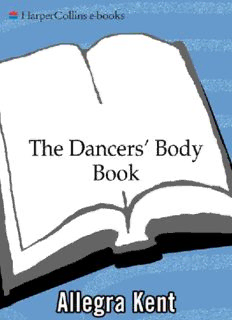
Dancers' Body Book PDF
Preview Dancers' Body Book
The Dancers’ Body Book ALLEGRA KENT with James and Constance Camner Contents Foreword v Acknowledgments vii Chapter One: Why Dancers Need to Diet—You Can’t Fool Anyone When You’re Wearing Tights 17 Chapter Two: The Dancers’ Secret 29 Chapter Three: The Dancers’ Diet 39 Chapter Four: A Diet to Live By 53 Chapter Five: Food for Dance: Dancers’ Recipes—Low-Calorie and Otherwise 77 Chapter Six: The Chain Around the Refrigerator 89 Chapter Seven: Ballet, the Oldest Beauty Exercise 95 Chapter Eight: Dancers’ Serious Exercise 105 Chapter Nine: Fun and Games 113 Chapter Ten: A Healthy Outlook 123 Chapter Eleven: Seven Diet Sins 135 Appendix: The Reading List 147 About the Author Other Books by Allegra Kent Cover Copyright About the Publisher FOREWORD Just about everyone is dieting these days, but dancers are more successful at it than most other people. Of course, the daily classes and rehearsals of a ballet company help dancers burn off calories and keep their figures trim. Yet, as the dancers themselves will explain, they need to be thinner than the rest of the general public and still eat enough to maintain energy and stamina levels. How do they do it? This book will answer that question, and many others as well, about how dancers build and maintain some of the most beautiful bodies in the world—and about how you, the reader, can take advantage of their experiences with diet, health and exercise. Dancers have a special attitude toward their bodies. It comes from their constant critical attention to their technique, form and appearance. As the public has become more conscious of losing weight and improving health, dancers too have become thinner and stronger through the influence of choreographers and stars. More than just a popular trend or a fashion fad, however, the slenderness of ballet dancers is a way of life. As Marika Molnar, physical therapist for the New York City Ballet, observes, “Ballet keeps up with society. It is moving fast and the choreography is fast—fast and hard. In order to keep up with that, dancers have to make adjustments to help their bodies as well.” In the following chapters you’ll discover how dancers make those adjustments—their diets, their special tips, their favorite exercises, even their own recipes. The dancers’ secrets to being thinner, healthier and having more energy will be revealed, not only for aspiring dancers to enjoy and take advantage of, but for the general public to learn from and emulate. Through a great many revealing personal interviews with dancers, from the youngest soloists to the most famous superstars of ballet, you’ll be finding out a lot about them that you might never have expected. And you’ll be learning about the ways that you too can apply what works for dancers to your own, non-dancing lifestyle. ACKNOWLEDGMENTS I want to thank my colleagues in the ballet world who, by sharing their thoughts on diet and fitness, made this book pos- sible. Along with the dancers were the many friends who also contributed their time and kind efforts to The Dancers’ Body Book. Merrill Ashley; Mikhail Baryshnikov; Toni Bentley; Jean-Pierre Bonnefous; Isabel Brown; Fernando Bujones; Dierdre Carberry; Christopher D’Amboise; Jacques D’Amboise; Alexandra Danilova; Parmenia Migel Ekstrom; Suzanne Farrell; Peter Fonseca; Alexan- der Goudenov; Cynthia Harvey; Susan Jaffe; Mary Kasakove; Darci Kistler; Tobias Leibovitz; Natalia Makarova; Patricia McBride; Marika Molnar; Doris Pearlman; Muriel Stuart; Mel Tomlinson; Martine van Hamel; Edward Villella; Heather Watts; Nancy Zeckendorf. CHAPTER ONE Why Dancers Need to Diet—You Can’t Fool Anyone When You’re Wearing Tights The number-one reason dancers have to diet is the merciless exposure of their bodies in class and onstage. Even certain cos- tumes can work against them, making them appear heavier or revealing an unattractive feature, and that’s especially true of tights. You can’t fool anyone when you’re wearing tights. Ounces become pounds under a leotard. Any extra weight is as easily noticed by the people in the back row as it is by the people in the front. No question about it, a leotard is probably more revealing than nudity. A dancer can look pretty terrible in tights unless she’s pared her weight down to the absolute minimum. There’s no in- between. That’s why I worry less about my weight when I’m dancing the roles that call for nightgowns as costumes instead of tights. There is nothing like an upcoming performance in a leotard to put the fear of fat into you! If a dancer really needs a reason to diet, tights will do it every time. Peter Fonseca, a dancer with American Ballet Theatre, says, “Suddenly I’m feeling ten pounds overweight and there’s a per- formance coming up and they say, ‘You have to wear white tights.’ You have to be skinny and you have to appear even skinnier, or you’re going to look fat onstage. “The management tells you this, you know. They’ll say, ‘You have to lose weight.’ Even though I’ve already been trying to lose and maybe have lost about five pounds, getting down to the low 17
Description: